Overview
The Master of Science Degree in Applied Computing gives you in-depth computing knowledge to solve complex real-world problems across industries and sectors. Through an interdisciplinary and rigorous full-time curriculum, you’ll be equipped to provide technical leadership in a professional setting or pursue further academic study.
About the program
Applied computing integrates information technology, computer science, and industry. You’ll take courses in core computing, and you will have the opportunity to work in an application area in another discipline. You’ll develop a deep understanding of how advanced computing, tools, and computational methods can be applied in practice to overcome challenges and create efficiencies.
- The program employs a cohort model, with the same group in all courses. This allows you to work through the program together, sharing your experience and expertise and building industry connections that will last long after you graduate
- 1 intake: September
- 4 15-week terms, normally completed over two academic years full time
- First year with two terms , delivered in-person, including:
- Algorithm analysis
- Human-centered Computing
- Machine Learning (ML) & Artificial Intelligence (AI)
- Data Science
- Cybersecurity
- Research methods
- Second year on thesis path or internship & project path
- Based on BCIT Burnaby Campus, and possibly the Downtown Campus or field locations where appropriate.
- You’ll be uniquely qualified to apply your knowledge and skills in various areas, such as:
- computational science
- rehabilitation engineering
- building science
- biotechnology
- autonomous vehicles
- sustainability
- smart micro-grids
- social impacts of technology
- network security
- an approved project area of your choosing based on your professional background
See the Program Details to learn more.
Who it’s for
This degree might be for you if you:
- Are inspired to maximize the societal benefit of computing by solving real-world issues
- Would like to apply your skills in industry after graduation, but might also consider applying for a PhD
- Are looking for a cohort-based program where you’ll work with other students to share problem-solving skills and approaches, as you would in a work setting
- Have an applied problem you believe could be improved through computing
- Would like to study with computing faculty, application experts outside of computing, and industry partners
Students will also have the opportunity to undertake directed studies with a supervisor in a different department to gain additional knowledge in a specific application area.
Please review the Entrance Requirements to learn more.
What grads can do
- Provide technical leadership for software/system development teams
- Demonstrate deep, critical knowledge and understanding of advanced topics in computing science
- Analyze how computing systems and software can be used in practical applications and interdisciplinary fields
- Design, develop, and implement innovative solutions to industry problems with consideration to relevant ethical, social and environmental issues
- Explain and advocate for applied computing solutions to specialist and non-specialist audiences in both business and academic settings
See the Graduating & Jobs page to learn more.
- Next up Entrance Requirements
Entrance Requirements
Applicants currently in the final term of their degree program must be on track to graduate by July prior to the start of the intake and may be conditionally accepted based on successful completion of their degree.
Application processing
Applications are accepted:
- First round: October 1* to January 31*
- Second round: February 1* to March 31*
- Third round: April 1* to July 31*
International applicants must hold a valid BCIT study permit to apply to the third round.
*or next business day
Indigenous applicants: Read about Indigenous student support available for BCIT Computing programs.
Entrance requirements
Competitive entry: Two-step process
Admission to the program is competitive, with preference given to applicants with a combination of:
- Academic grades above the minimum
- Relevant industry experience
Step 1: Meet the following entrance requirements:
- English language proficiency: Graduate Studies – English Studies 12 (67%) or equivalent
- One of the following entry requirements:
Option 1: standard entry- Post-secondary education: A bachelor’s degree in computer science or equivalent, such as BCIT’s Bachelor of Science in Applied Computer Science, with a minimum GPA of 2.8 out of 4.0 (70%) based on the final 30 credits of undergraduate study at BCIT or equivalent (e.g., one year of full-time studies).
Alternate entry is for applicants who don’t have a bachelor's degree in computer science and may need to take bridging courses before being accepted to the program. Applicants are required to have the following:- Post-secondary education: bachelor's degree with a minimum GPA of 3.0 out of 4.0 (73%) in another discipline based on the final 30 credits of undergraduate study, with significant knowledge of computing through formal education and/or work experience.
- Completed Pre-entry Assessment form [PDF]: submit the form to CompMSc@bcit.ca. The program area will review your pre-entry assessment and bridging courses may be required before applying to the program. Bridging courses will be recommended from existing COMP courses at BCIT, although transferable course work from other recognized Canadian post-secondary institutions may also be used. Applicants may be requested to send additional documents or meet with the program area.
- Complete the following form for submission with your online application:
- Mandatory Applicant Questionnaire [PDF]: This form will be used with other entrance requirements in the competitive selection for the program.
Applicants who have completed post-secondary studies outside of Canada, the United States, the United Kingdom, Australia or New Zealand will require a comprehensive evaluation of their credentials by the International Credential Evaluation Service (ICES). Credential evaluation reports from other Canadian services may be considered.
Step 2: Department Review
All complete applications will be reviewed by the Graduate Program Committee and ranked competitively, and applicants will be offered admission accordingly. Only complete applications with all the required supporting documentation will be evaluated for admission consideration to the program.
Recommended for success
Applicants with a sufficient knowledge base in computer science will be best positioned for success in this program. This may include students who have studied information and communications technology (ICT), engineering, physics, mathematics, applied sciences, or other areas where they have been exposed to computing, information technology, and programming concepts.
International applicants
This program is available to international applicants.
Study permit: A valid BCIT study permit is required prior to starting the program.
Students enrolled in the Project & Internship Path of this program must complete the mandatory work component to qualify for graduation. A co-op work permit is required prior to starting the work component.
Post-graduation Work Permit (PGWP) eligibility: This program currently meets the PGWP eligibility requirements based on study program - graduates with a master's degree and is eligible for students to apply for a PGWP. There are no field of study requirements (CIP) for graduates with a master’s degree.
Students are responsible for meeting all Immigration, Refugees, and Citizenship Canada (IRCC) PGWP eligibility requirements. Final PGWP approval is at the discretion of IRCC.
Apply to program
To submit your application:
- Include proof of meeting all entrance requirements.
- Convert all transcripts and supporting documents to PDF files.
- Have a credit card ready to pay the application fee.
Apply Now
Scheduled Intakes
September each year.
- Go back Overview
- Next up Costs & Supplies
Costs & Supplies
Tuition fees
Use our tuition estimator to find tuition and fees for this program.
For more information on full-time tuition and fees, visit:
Books & supplies
Each term: $450
(general estimated cost, subject to change).
Students are expected to have their own laptops.
Financial assistance
Financial assistance may be available for this program. For more information, please contact Student Financial Aid and Awards.
- Go back Entrance Requirements
- Next up Courses
Courses
Class hours
8:30 am to 5:30 pm.
Program matrix
| Level 1 (15 weeks – September to December) | Credits | ||
|---|---|---|---|
| COMP 9060 | Applied Algorithm Analysis | 3.0 | |
| COMP 9170 | Data Science* | 3.0 | |
| COMP 9200 | Applied Research Methods | 3.0 | |
| *COMP 9190 - Application Area Directed Studies can be a substitute for any of the courses: COMP 9130, COMP 9150, or COMP 9170. | |||
| Level 2 (15 weeks – January to April) | Credits | ||
| COMP 9040 | Human-centered Computing | 3.0 | |
| COMP 9080 | Research Proposal | ||
| COMP 9130 | Applied Artificial Intelligence* | 3.0 | |
| COMP 9150 | Cyber Security for Applied Computing* | 3.0 | |
| *COMP 9190 - Application Area Directed Studies can be a substitute for any of the courses: COMP 9130, COMP 9150, or COMP 9170. | |||
| Levels 3 & 4 | Credits | ||
| Thesis Path (30 weeks – September to April) | |||
| COMP 9600 | M.Sc. Thesis | 12.0 | |
| or | |||
Project & Internship Path Students may take their industry internship in the Spring/Summer or Fall term and complete their research project in the following Fall or Winter term. Please note that COMP 9290 is offered in the fall term. |
|||
| COMP 9290 | Special Topics in Applied Computing | 3.0 | |
| COMP 9400 | Industry Internship | 6.0 | |
| COMP 9500 | M.Sc. Research Project | 3.0 | |
| Total Credits: | 30.0 | ||
Transfer credit
Do you have credits from another BC/Yukon post-secondary school? Do you want to know if they transfer to courses here at BCIT? Check out BCIT's Transfer Equivalency Database to find out.
- Go back Costs & Supplies
- Next up Program Details
Program Details
This degree focuses on Applied Computing, which is fundamentally related to applying computing technology and computational methods to derive solutions to complex practical problems. Course work will emphasize current issues in industry, case studies, and applied research projects.
This program offers you a chance to work with an interdisciplinary and diverse team of academic supervisors that may include faculty from Computing, faculty from an application domain, as well as industry practitioners. You’ll also have the opportunity to undertake directed studies with a supervisor in a different department to explore a specific application area. For more information about faculty, visit the Faculty, Advisors & Staff page.
Applied research is fundamental to the program. Two paths are offered, diverging in second year:
- Thesis Path – Path 1: complete a thesis project and defend it in your second year. You’ll need to demonstrate originality in the application of your knowledge, either through new publishable research, or a novel solution to an existing practical problem. This is the best path if you’re interested in possibly pursuing a future Ph.D.
- Project & Internship Path – Path 2: a one-semester research project with a one-semester internship, which may be paid or unpaid. The internship will involve an external company or a BCIT lab where you can learn how advanced computing techniques are applied to solve interdisciplinary problems. The research project may be done in collaboration with the sponsor from the internship, providing added value in terms of practical utility. Students will also complete a 3-credit special topics course, covering emerging areas in Applied Computing, such as Quantum Computing, Generative AI, or Deep Learning.
Both paths will require students to:
- examine literature in a related discipline,
- recognize gaps and limitations in existing technologies and processes,
- organize and plan their approach, and
- demonstrate competence in applying advanced techniques to solve problems.
In both paths, students will present a written argument that addresses a complex problem in applied computing.
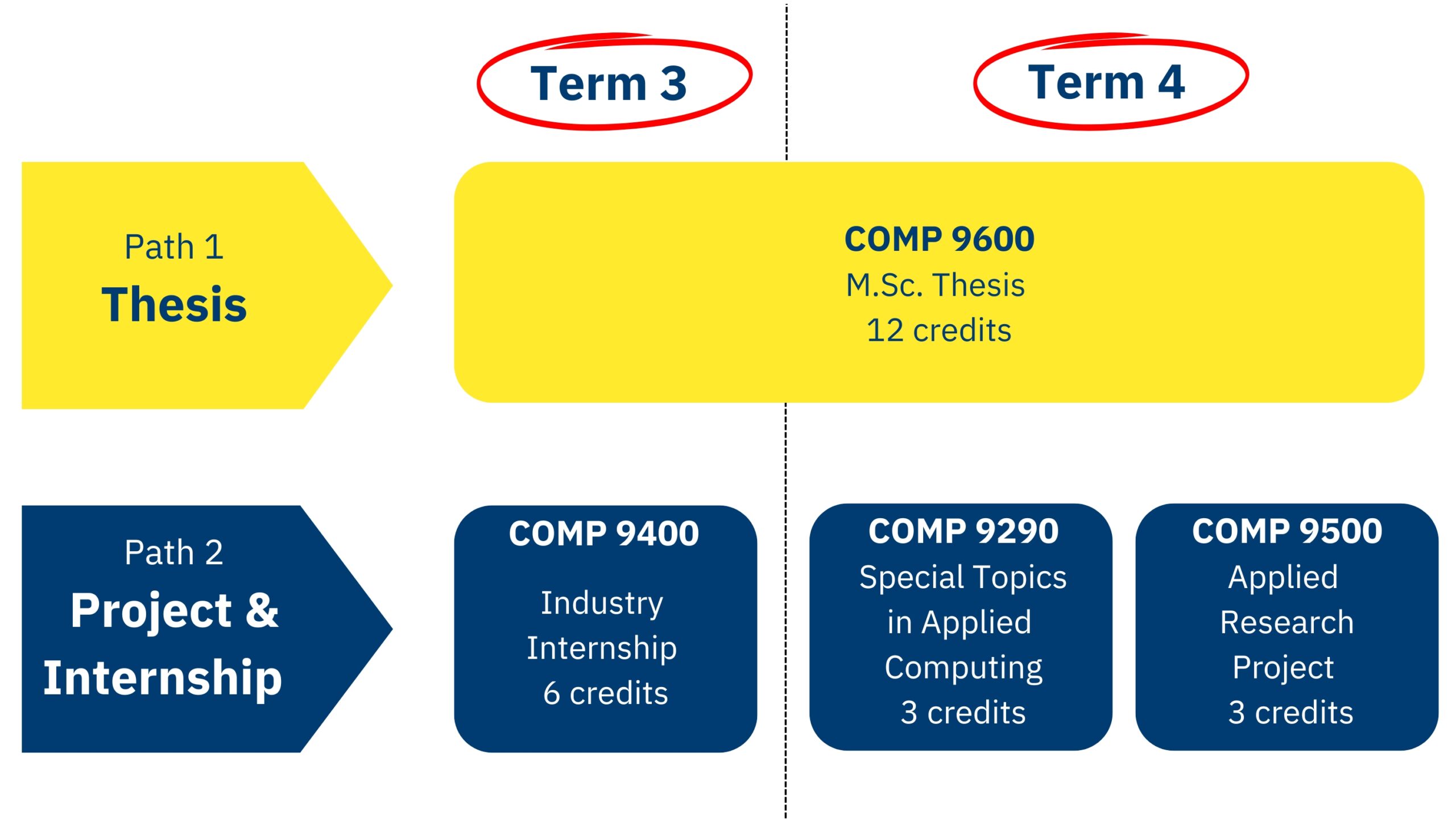
Did you miss our Info Session? Please see the recording from October 2024:
Program length
Two years, full-time.
The maximum time to complete this program is five years.
Grading
Students will be required to maintain a minimum average of 70% across all courses in the program before starting their thesis or research project.
Student progress through the program will be monitored by the supervisor, in consultation with the Program Head.
Program delivery
In person: This program is delivered on campus.
Program location
Burnaby Campus
3700 Willingdon Avenue
Burnaby, BC
- Go back Courses
- Next up Graduating & Jobs
Graduating & Jobs
Job opportunities
Our grads will be able to lead and be part of exciting and essential technical transformations across organizations as our society and economy evolve through technology.
Technology in the workforce
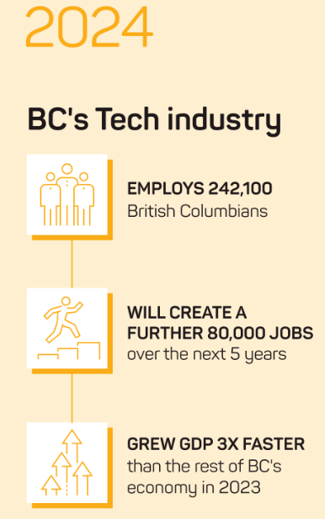
The World Economic Forum (WEF) Future of Jobs 2023 predicts that technology adoption will remain a key driver of business transformation, especially in the areas of big data analytics, cloud computing, digitization of commerce and trade, AI, climate change and environmental management technologies, encryption and cybersecurity, agriculture technologies, digital platforms and apps.
WEF also reports that the fastest-growing roles relative to their size today are driven by technology, digitalization and sustainability.
The majority of the fastest-growing roles are technology-related roles. AI and Machine Learning Specialists top the list, followed by Sustainability Specialists, Business Intelligence Analysts and Information Security Analysts.
AI is rapidly becoming a catalyst for growth, driving new tech talent hiring. (CBRE 2024)
Canadian Research & Development (R&D) in ICT
Information and Communication Technology (ICT) industries are the largest performers of R&D in the Canadian private sector. ICT sector R&D expenditures totaled $14.1 billion in 2023, approximately 45.0% share of all private sector R&D expenditures in Canada. The largest increases are expected in software and computer services (+5.9%) and ICT Manufacturing (+13.8%).
R&D expenditures by ICT industry, 2023, total: $14.1 billion (Source)
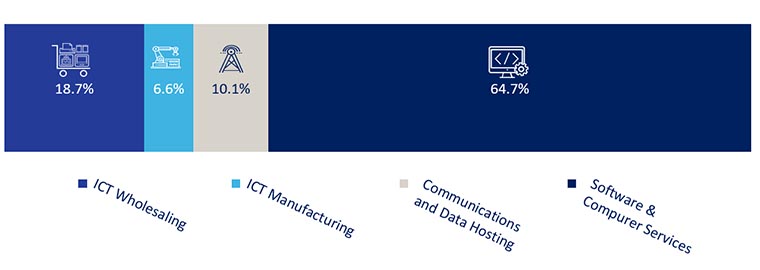
Local Tech Scene
Vancouver is one of the top three cluster cities for tech talent in Canada, with a tech talent workforce representing approximately 7.4% of the market. Toronto, Vancouver, and Montreal are the leading AI-development markets in Canada, accounting for 60% of the country’s AI-specialty tech jobs. (CBRE 2024)
Apply for graduation
Upon successful completion of all program requirements, complete an Application for BCIT Credential [PDF] and submit it to Student Information and Enrolment Services.
Allow approximately six to eight weeks for processing.
All financial obligations to the Institute must be met prior to issuance of any credential.
- Go back Program Details
- Next up Faculty, Advisors & Staff
Faculty, Advisors & Staff
Bal Lidhar
Program Coordinator
Email: CompMSc@bcit.ca
Computing
 |
Dr. Aaron Hunter Mastercard Chair in Digital Trust Academic Background Ph.D., Computing Science Research Activities Artificial Intelligence, Knowledge Representation, Trust, Information Security Relevant Links Bio |
 |
Dr. Michal Aibin
Academic Background Research Activities Relevant Links |
 |
Dr. Borna Noureddin
Academic Background Research Activities |
 |
Dr. Fatemeh Riahi
Academic Background Research Activities |
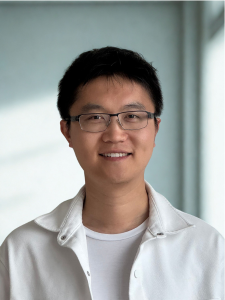 |
Dr. Hao Ma
Academic Background Research Activities Relevant Links |
 |
Dr. Mirela Gutica
Academic Background Research Activities Relevant Links |
| Dr. Chi En Huang
Academic Background Research Activities |
Affiliated supervisors outside Computing
The following BCIT faculty may be suitable supervisors or co-supervisors for relevant applications of computing.
 |
Dr. Jaimie Borisoff Director, MAKE +, BCIT Applied Research Academic Background Ph.D., Neuroscience, Bachelor of Applied Science in Engineering Physics Research Interests Quantitative and qualitative evaluation of people using technology (e.g., eye tracking when using a wheelchair and Mocap), development of new devices in rehabilitation, medical devices, wheeled mobility, assistive technology, adapted exercise and fitness, accessibility, rehab robotics Relevant Links MAKE + Product Development | Rehabilitation Engineering Design Lab | ICORD |
 |
Dr. Michael Harder Academic Background Ph.D., Physics Research Interests Condensed matter physics focused on magnetism and spin dynamics. In particular: spintronics, magnetic materials, magnetization dynamics, spin-photon hybridization, collective/emergent phenomena and related applications. Relevant Links Google Scholar |
 |
Dr. Russell Hartlaub Academic Background Ph.D., Earth Sciences Research Interests Analysis and display of geological and geochemical data, Critical Minerals, Mineral Resource Estimation, and the use of computing tools in geological fieldwork. |
 |
Dr. Dean Hildebrand Academic Background Ph.D., Biochemistry and Molecular Biology Research Interests DNA Analysis |
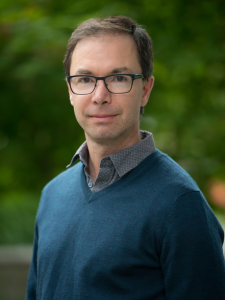 |
Dr. David Holloway Academic Background Ph.D., Physical Chemistry Research Interests Developing, coding and testing mathematical models in biology; coding; optimization of equation solution and parameter fitting; machine learning for solution sets; discrete vs. continuous representations of gene networks; image analysis; mathematical models of animal and plant development Relevant Links Personal website |
 |
Dr. Yvette Jones Academic Background Ph.D., Biomedical Engineering Expertise Quantitative and qualitative evaluation and validation of technology, including biomechanics, human factors, ergonomics, and medical device development Relevant Links MAKE + Team |
 |
Dr. Djamel Khelifi Academic Background Ph.D., Organic Chemistry Research Interests Pharmaceuticals, Organic Synthesis and Biosynthesis of Natural Products, Analytical Chemistry, natural health products, Anti-Cancer Polyacetylenes |
 |
Dr. Stefan Lukits Academic Background Ph.D., Philosophy Research Interests Information theory, formal epistemology, probability theory Relevant Links Publications |
 |
Dr. Moein Manbachi Academic Background Ph.D., Engineering Science Research Interests Smart grid optimization using AI, digital twin modeling of critical energy infrastructure, data/energy hub design, smart grid energy management system, energy infrastructure cybersecurity Relevant Links SMART Team | Cybersecurity Lab | Google Scholar |
 |
Dr. Sarah McLeod Academic Background Ph.D., Microbiology and Immunology Research Interests Microbiology, immunology |
 |
Dr. Jennie Moore Academic Background Ph.D., City/Urban, Community and Regional Planning Research Interests Measuring and managing for living within earth’s carrying capacity at the city scale; Integrated energy and materials flows analysis; Eco-footprint impacts; Greenhouse gas management; Municipal strategies for climate action and resilience Relevant Links Centre for Ecocities |
 |
Dr. Rodrigo Mora Academic Background Ph.D., Building Information Modelling, P. Eng. Research Interests Building science: smart buildings; occupant-centric design and operation; building environmental quality; climate change and the built environment; machine learning applications; remote sensing and monitoring Relevant Links Bio |
 |
Dr. Takashi Nakamura Academic Background Ph.D., Physics Research Interests Quantum mechanics, machine learning, simulation, quantum computing, quantum communication |
 |
Dr. Barry Pointon Academic Background Ph.D., Physics Research Interests Medical imaging, nuclear medicine, particle physics, machine learning, data analysis, simulation |
 |
Dr. Eric Saczuk Academic Background Ph.D., Factors Affecting Risk from Natural Hazards Research Interests GIS, geomorphology, remote sensing, remotely piloted aircraft systems, mapping sciences Relevant Links RPAS Hub | Indro Robotics |
 |
Dr. Aarati Sriram Academic Background Ph.D., Cell & Developmental Biology Research Interests Human Anatomy & Physiology, Pathophysiology, Cell & Molecular Biology |
 |
Dr. Vidya Vankayala Director, SMART Academic Background Ph.D., Electrical & Computer Engineering Research Interests Smart grids, monitor and manage power system assets, cyber-physical system consequence modeling to prevent attacks on electrical networks |
 |
Dr. Steve Walker Academic Background Ph.D., Chemistry – Molecular reaction photo-dynamics Research Interests -Computational chemistry, focused on how can we leverage machine learning to become more efficient in the use of computational resources involved in theoretical chemical systems.-Trying to bridge between conventional computational chemistry such as density functional theory and couple cluster systems with the advances in machine learning and AI.-Novel mass spectrometry techniques such as differential ion mobility.-Molecular clusters. Relevant Links Google Scholar |
 |
Dr. Carol Wenzel Academic Background Ph.D., Plant Sciences Research Interests Biotechnology, plant developmental biology, hormone physiology, vascular patterning, leaf production, drought stress tolerance, exercise/rehabilitation |
Advisory committee
BCIT is well-respected by employers for its ties to industry. In Computing, this connection is formalized through a Program Advisory Committee (PAC) comprised of experts in a range of roles from a cross-section of companies. The department consults regularly to ensure program currency and relevance.
- Go back Graduating & Jobs
- Next up Contact Us
Contact Us
Erdem Gulova
Program Coordinator
Email: CompMSc@bcit.ca
Questions or comments?
- Go back Faculty, Advisors & Staff
- Next up Subscribe
Subscribe
Sign up to receive updates, invitations to events, and information about BCIT and your program.
We promise not to spam you, we won’t share your personal information, and you can unsubscribe at any time.
- Go Back Contact Us
Programs and courses are subject to change without notice.

